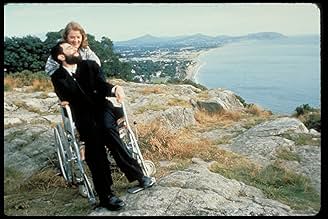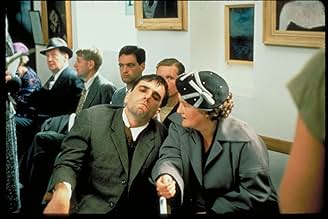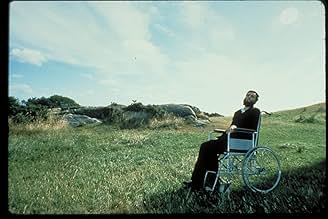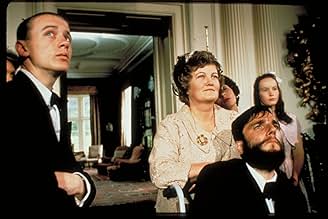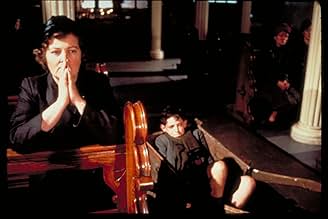अपनी भाषा में प्लॉट जोड़ेंChristy Brown, born with cerebral palsy, learns to paint and write with his only controllable limb - his left foot.Christy Brown, born with cerebral palsy, learns to paint and write with his only controllable limb - his left foot.Christy Brown, born with cerebral palsy, learns to paint and write with his only controllable limb - his left foot.
- निर्देशक
- लेखक
- स्टार
- 2 ऑस्कर जीते
- 23 जीत और कुल 20 नामांकन
Pat Laffan
- Barman
- (as Patrick Laffan)
Owen Sharpe
- Young Tom
- (as Owen Sharp)
फ़ीचर्ड समीक्षाएं
I can still remember the fuss that was made when this movie was first released. Everybody was applauding it. 14 years down the line the film is very dated, but still very enjoyable but more importantly very powerful. The story centers around Poet, artist and author to be Christy Brown. He suffers from Celerbal Paulsy (I hope that is spelled right) which means to be all three of the above occupations is some feat that should not go unnoticed. He lives in a large family (13 children, not all who suffered) in a small terraced house in Dublin's City Center. The movie begins with his birth and the late great Ray Mc Nally being told by a nurse that there were complications during the birth. We move forward a couple years to where we see a young Christy (played by Hugh O'Connor) being helped around by his mother. It is a sad sight to see him underneath the stairs of his family home watching his brothers and sisters (all Abled bodied) living a normal lifestyle (despite being poor) and knowing that he is just as well able to communicate. The finest scene in this early stage of his life is when Christy writes for the first time. In front of his family. His father is sceptical at first however his opinion is reversed when Christy finally proves that he is not the idiot that everybody thinks him to be. We then move to Christy's later teenage years where he meets a nurse with whose help he begins to learn how articulate his words. However Christy becomes infatuated with this lady. His mother is delighted that her son is happy however his father is once again the sceptic but this time he has good cause to as Christy's heart is broken when this woman announces that she is engaged to an Art dealer. This film is brilliant and I have a massive amount of praise for Daniel Day-Lewis who portrays Christy as an angry young man who is coming to terms with everything in his life. He is disturbed by womens reluctance to accept him and his condition, He is fed up of his fathers treatment of his mother and his siblings. Day-Lewis is totally immersed in his character and it is one of his finest roles. I have seen old interviews with the real Christy Brown and I can safely say that it is hard at times to distinguish is it Christy Brown or Daniel Day-Lewis on the screen. However the show is stolen from him by the finer performances of young Hugh O'Connor and Ray Mc Nally. Both of whom should have got Oscars as Best Supporting Actor (O'Connor) and Best Actor (Ray Mc Nally). O'Connor definitely proves himself in the role because he portrays the same qualities that Day-Lewis does as a frustrated youngster. Mc Nally defines the typical Irish Father role that would be made humorous by Colm Meaney in a number of films. It is such a great pity that he died shortly after this film. Brenda Fricker must also be mentioned as the doting mother who does everything that she can to help Christy reach his full potential. Again she is life like to Christy Browns real life mother however I think there were more deserving people for that Best Supporting Actress Oscar. This film is an amazing piece of independent film making and it really does so the potential of Jim Sheridan as a director and actor. He would further develop the themes of family, Irish society, loyalty in his other films. 9 out of 10.
Daniel Day-Lewis' almost impossible performance as a man with cerebral palsy earned him a well-deserved Oscar in 1989 for Best Actor over the heavily favoured Tom Cruise in 'Born on the Fourth of July' and Morgan Freeman in 'Driving Miss Daisy'. The Academy was still riding the wave of awarding Dustin Hoffman a second Best Actor prize a year earlier for his performance as a mentally challenged individual in 'Rain Man' and since Day-Lewis' performance was superior to Hoffman's, the Academy had to recognize him. Day-Lewis probably would have won anyway as his performance was hard to ignore and he had never received any acting nominations from the Academy before this film despite turning in great work in such films as 'The Unbearable Lightness of Being' and 'My Beautiful Laundrette.'
As Christy Brown, Daniel Day-Lewis makes his character unsympathetic as he doesn't want you to feel sorry for him. He achieved the great success of being an accomplished writer and artist. Director Jim Sheridan directs the film like a series of home movies that millions want to see.
Brenda Fricker won the Oscar as Best Supporting Actress as Brown's mother and she is the real moral centre of the film and this film proves that Hollywood is capable of choosing small, lesser known films for Oscar consideration and 'My Left Foot' is a film that is uplifting without being sentimental.
As Christy Brown, Daniel Day-Lewis makes his character unsympathetic as he doesn't want you to feel sorry for him. He achieved the great success of being an accomplished writer and artist. Director Jim Sheridan directs the film like a series of home movies that millions want to see.
Brenda Fricker won the Oscar as Best Supporting Actress as Brown's mother and she is the real moral centre of the film and this film proves that Hollywood is capable of choosing small, lesser known films for Oscar consideration and 'My Left Foot' is a film that is uplifting without being sentimental.
Notable for marking the commencement of Daniel Day-Lewis' personal version of method acting, My Left Foot presents the widely acclaimed actor pushing himself to the extreme in what is undoubtedly one of the proudest works of his acting career. And even though the film doesn't have anything else to offer, the performances are strong enough to keep the viewers engaged.
Based on the autobiography of the same name, My Left Foot tells the story of Christy Brown; an Irishman who was born with cerebral palsy but despite his handicap went on to become an artist & writer, all with the help of the only thing he could fully control: his left foot. The film covers his upbringing in a poor family, his daily struggles, discovery of new passions & also his stint with love.
Wonderfully directed by Jim Sheridan, the film is heartwarming & heartbreaking at the same time, and is an inspiring insight into the life of Christy Brown that makes the viewers go through various emotions, but pity isn't one of them. The technical aspects are finely executed & have nothing special going on but it's in the performances where the film manages to make the most lasting impression.
There are three key performances that are worth noting here. First is Daniel Day-Lewis who delves into his character like never before & plays him from inside-out. Next is Brenda Fricker who strongly chips in as Christy's mother. And last we have Hugh O'Connor who is as good as Day-Lewis for his portrayal of young Christy Brown sets up a perfect stage for Day-Lewis to take over.
On an overall scale, My Left Foot is a touching tale about the indomitable will of the human spirit to triumph against all odds, and succeeds mainly because of the unforgettable performances from its highly committed cast. But even if the film is entirely dependent on its acting strength, it still makes up for a rich cinematic experience that comes as a must for Daniel Day-Lewis' admirers as well as critics.
Based on the autobiography of the same name, My Left Foot tells the story of Christy Brown; an Irishman who was born with cerebral palsy but despite his handicap went on to become an artist & writer, all with the help of the only thing he could fully control: his left foot. The film covers his upbringing in a poor family, his daily struggles, discovery of new passions & also his stint with love.
Wonderfully directed by Jim Sheridan, the film is heartwarming & heartbreaking at the same time, and is an inspiring insight into the life of Christy Brown that makes the viewers go through various emotions, but pity isn't one of them. The technical aspects are finely executed & have nothing special going on but it's in the performances where the film manages to make the most lasting impression.
There are three key performances that are worth noting here. First is Daniel Day-Lewis who delves into his character like never before & plays him from inside-out. Next is Brenda Fricker who strongly chips in as Christy's mother. And last we have Hugh O'Connor who is as good as Day-Lewis for his portrayal of young Christy Brown sets up a perfect stage for Day-Lewis to take over.
On an overall scale, My Left Foot is a touching tale about the indomitable will of the human spirit to triumph against all odds, and succeeds mainly because of the unforgettable performances from its highly committed cast. But even if the film is entirely dependent on its acting strength, it still makes up for a rich cinematic experience that comes as a must for Daniel Day-Lewis' admirers as well as critics.
Daniel Day Lewis is one of the best actors of our time and one of my favorites. It is amazing how much he throws himself in each of the characters he plays making them real.
I remember, many years ago, we had a party in our house - the friends came over, we were sitting around the table, eating, drinking the wine, talking, laughing - having a good time. The TV was on - there was a movie which we did not pay much attention to. Then, suddenly, all of us stopped talking and laughing. The glasses did not clink, the forks did not move, the food was getting cold on the plates. We could not take our eyes off the screen where the young crippled man whose entire body was against him and who only had a control over his left foot, picked up a piece of chalk with his foot and for what seemed the eternity tried to write just one word on the floor. When he finished writing that one word, we all knew that we had witnessed not one but three triumphs - the triumph of a human will and spirit, the triumph of the cinema which was able to capture the moment like this on the film, and the triumph of an actor who did not act but who became his character.
Jim Sheridan's "My Left Foot" is an riveting, unsentimental bio-drama about Christy Brown, the man who was born with cerebral palsy in a Dublin slum; who became an artist and a writer and who found a love of his life.
I like every one of Day Lewis's performances (I have mixed feelings about his performance in GONY) but I believe that his greatest role was Christy Brown in "My Left Foot"
I remember, many years ago, we had a party in our house - the friends came over, we were sitting around the table, eating, drinking the wine, talking, laughing - having a good time. The TV was on - there was a movie which we did not pay much attention to. Then, suddenly, all of us stopped talking and laughing. The glasses did not clink, the forks did not move, the food was getting cold on the plates. We could not take our eyes off the screen where the young crippled man whose entire body was against him and who only had a control over his left foot, picked up a piece of chalk with his foot and for what seemed the eternity tried to write just one word on the floor. When he finished writing that one word, we all knew that we had witnessed not one but three triumphs - the triumph of a human will and spirit, the triumph of the cinema which was able to capture the moment like this on the film, and the triumph of an actor who did not act but who became his character.
Jim Sheridan's "My Left Foot" is an riveting, unsentimental bio-drama about Christy Brown, the man who was born with cerebral palsy in a Dublin slum; who became an artist and a writer and who found a love of his life.
I like every one of Day Lewis's performances (I have mixed feelings about his performance in GONY) but I believe that his greatest role was Christy Brown in "My Left Foot"
Christy Brown is born with cerebral palsy. His father (Ray McAnally) refuses to give him up and he learns to live with controlling only his left foot. His loving mother (Brenda Fricker) tirelessly raise him. As a child (Hugh O'Conor), everybody assumed that he's a simpleton until he wrote MOTHER with chalk. As a young man (Daniel Day-Lewis), he is rejected by the pretty girl. His father loses his job and becomes abusive. He falls for Dr. Cole (Fiona Shaw) treating his cerebral palsy but she's engaged. As an older man, he falls for his nurse Sheila (Alison Whelan).
It's a tough way to act for Daniel Day-Lewis. It's not just the physicality but he has to make sense despite his speech pattern. He has to be understandable without speaking understandable English. It's his anger and his unlikeability that brings out his humanity. He's not playing a saint or a caricature. It's a real person. It's an all-around performance.
It's a tough way to act for Daniel Day-Lewis. It's not just the physicality but he has to make sense despite his speech pattern. He has to be understandable without speaking understandable English. It's his anger and his unlikeability that brings out his humanity. He's not playing a saint or a caricature. It's a real person. It's an all-around performance.
क्या आपको पता है
- ट्रिवियाAccording to the "Making of My Left Foot" segment on the Special Edition DVD, Sir Daniel Day-Lewis broke two ribs during filming from assuming the hunched-over position in his wheelchair for weeks of filming. He also would refuse to come out of character. On visits to the set canteen, other people would have to help him with food. On one visit from his English agent, Day-Lewis again refused to come out of character as Christy Brown, and his frustrated agent took off.
- गूफ़In the beginning of the movie, when Mary Carr gets Christy Brown into the library, the shadow of the boom mic can clearly be seen on a white door.
- भाव
Christy Brown: I've had nothing but Platonic love all me life. Do you know what I say? FUCK PLATO! And fuck all love that's not a hundred percent commitment!
- साउंडट्रैकFoggy Dew
(uncredited)
Traditional
टॉप पसंद
रेटिंग देने के लिए साइन-इन करें और वैयक्तिकृत सुझावों के लिए वॉचलिस्ट करें
- How long is My Left Foot?Alexa द्वारा संचालित
विवरण
- रिलीज़ की तारीख़
- कंट्री ऑफ़ ओरिजिन
- आधिकारिक साइटें
- भाषा
- इस रूप में भी जाना जाता है
- Mi pie izquierdo: la historia de Christy Brown
- फ़िल्माने की जगहें
- उत्पादन कंपनियां
- IMDbPro पर और कंपनी क्रेडिट देखें
बॉक्स ऑफ़िस
- बजट
- £6,00,000(अनुमानित)
- US और कनाडा में सकल
- $1,47,43,391
- US और कनाडा में पहले सप्ताह में कुल कमाई
- $41,165
- 12 नव॰ 1989
- दुनिया भर में सकल
- $1,47,43,391
इस पेज में योगदान दें
किसी बदलाव का सुझाव दें या अनुपलब्ध कॉन्टेंट जोड़ें

टॉप गैप
What is the Hindi language plot outline for My Left Foot: The Story of Christy Brown (1989)?
जवाब


